Starlog #144 / July 1989
Richard Chaves: Warlord of the Worlds
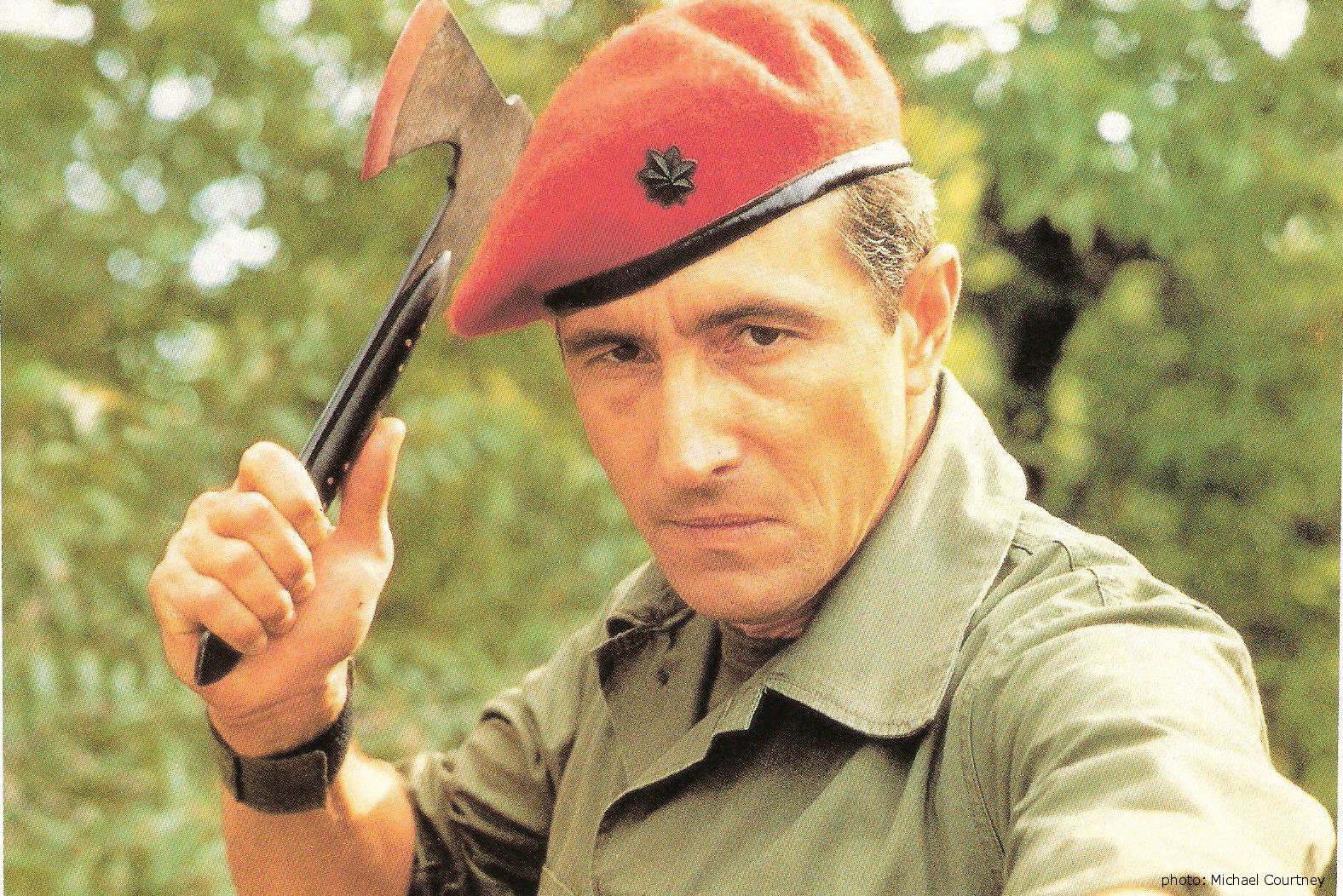
He survived Vietnam. Now, he’s back in uniform, fighting aliens on a TV battlefield.
By PETER BLOCH-HANSEN
He doesn't look like an altar boy. A soldier, a warrior, the world's foremost alien fighter, maybe. But Richard Chaves, alias Poncho in Predator and Lt. Col. Paul Ironhorse on War of the Worlds insists his career began when "I first got a sense of it as an altar boy.
"In a biography," Chaves reveals, "Gregory Peck explained when he first got involved in the business. He said that, as an altar boy, he had to learn his lines in Latin, learn the ritual and the blocking of the mass, and get up in front of people to do it over and over again. That was when he first got the sense of being an actor. It was the same for me."
In his U.S. Army Special Forces battle dress, sitting in his red folding chair on the War of the Worlds set, Chaves hardly looks anything like the altar boy he once was. Ironically, a tour of infantry duty in Vietnam both interrupted and shaped the direction of his acting career.
"I had a really low draft number," Chaves recalls, "so I knew I was going to be drafted. I had grown up in the Marine Corps with my dad being an officer, so I didn't have an aversion to the military. I knew what I was getting into and I joined in May 1970, serving in Vietnam with the 196th Infantry Brigade."
Prior to that, Chaves had acted in school, then studied acting at Occidental College in Eagle Rock, California. When he got back from Vietnam in 1973, he dabbled in theater while toiling as a truck driver, a hotel clerk and a postal worker.
Starting in May 1976, Chaves studied at the Film Actors' Workshop at Burbank Studios, one of only two acting schools actually located on studio lots. "I had never done any camera technique or been in front of the camera," Chaves says, "so I spent four years there."
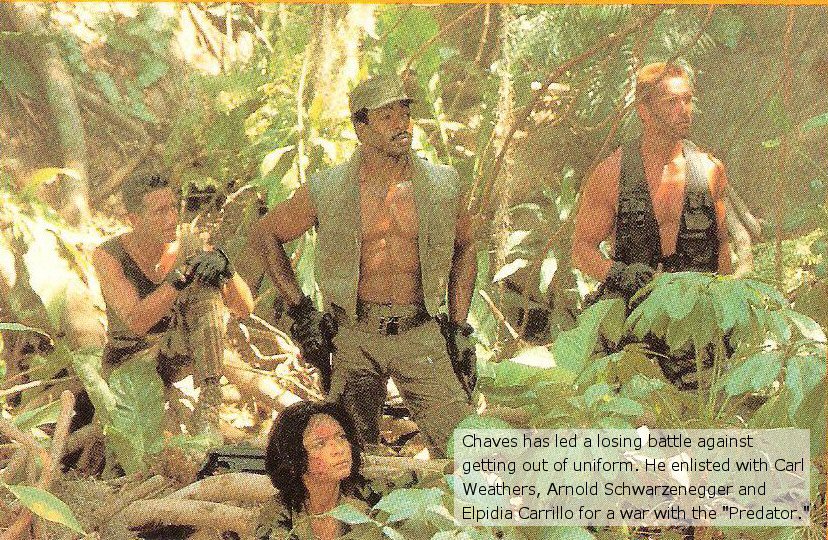
Finally, in 1980, "There was an ad in Dramalogue, asking for professional actors who were Vietnam veterans for a Vietnam play called Tracers. I was chosen as one of eight veterans to be in it. We sat around and wrote it, based on our own experiences. Everybody came to see the play, Stanley Kubrick, Jon Voight, Oliver Stone. I've been told by these people that our play influenced all the subsequent movies about Vietnam. Tracers is to the stage what Platoon is to the screen."
Tracers garnered many awards and went on to be performed in Chicago, New York and London before returning to Los Angeles in 1986. For Chaves, it opened the doors to Hollywood. Offers came in: Eight is Enough, Fire on the Mountain, Dallas, Hill Street Blues and St. Elsewhere. "It all came from casting directors seeing me in that play," Chaves maintains. "Part of what made it so successful was that audiences knew that it was not only written by Vietnam veterans, but performed by them."
Military Applications
Chaves' big break came with Predator. "Jackie Burch, the casting director, had me up for The Three Amigos," he reveals, "but I didn't get the part." Burch then took him to meet director John Mc tiernan, who was casting a movie called The Hunter. "They changed it to Predator. Anyway, John liked my work in Tracers. I never had to read a line or audition for the part. John just said, 'Tell me about yourself.' I talked to him for about an hour about my life.
"Four days later, producer Joel Solver questioned me about the part and the script. I told him that I loved it, that I thought it would be a lot of hard work, a very difficult shoop and that they needed people who knew what they were doing, militarily speaking. He turned to the director and sadi, 'Is Richard what you want?' John nodded yes. Then, Joel turned to Jackie Burch and said, 'Set him.' I was in shock. I sarted to say, 'thank you, thank you, thank you,' and Jackie grabbed me and dragged me out of the room."
The difficulties that Chaves predicted for Predator, though, did indeed materialize. "It was pretty touch," he comments. "When we were out there in the jungle, it was just like being back in Vietnam, for the most part, both physically and emotionally. I was ip on a ridge line once with Jesse "The Body' Ventura, who is also a vet, all suited up. To the right were the lights and camera and all the crew and equipment. To the left of us was just the raw jungle. We were reminiscing about Vietnam. He looked right and left and said, 'Richard, thank God for the right side of this picture.'
"I got a lot of bug bites. I picked ticks off my body many, many nights. Physically, Predator was one the hardest things I've ever done."
The downhill attack of Arnold Schwarzenegger's commandos against the guerilla camp took more than four weeks to shoot. "The stunt people, Craig Baxley and his A-Team crew, would be working second unit," Chaves explains. "We would be doing other stuff. Then they would call us in. The mow-down scene, where we mowed down the jungle with our weapons, that took us three days to film - in the rain."
Still, it was on Predator that Chaves first encountered Arnold Schwarzeneggers's famous bent for practical jokes. "we were in southern Mexico for the waterfall stuff," he recounts. "It was heavy, heavy jungle, right in the middle of freaking nowhere - bugs you've never seen before, weird animals and a lot of frogs. So, Arnold and some of the crew got a whole bunch of frogs and put them in my hotel room.
"I was dead tired. I crawled into my bed and there were things moving. I turned on the light and there were frogs all over the place. Attack of the Freaking Frogs! I went down to the desk across the lobby and there in the lounge were Srnold and the boys, falling on the floor laughing."
Chaves bears no malice, though. "There were many practical jokes on that set," he explains. "Arnold is the forst to be the consummate professional, but at the same time, when things are tense, maybe not going right, he's the first to loosen eveyone up a bit with his humor. You have to do that sometimes."
But Chaves is hardly content as a victim. "I got Arnold back," he boasts, a mischievous grin lighting his face. "To keep his body tanned, Arnold would drop his pants during breaks, and take off his shirt. So, one day he was sitting in his chair in his boxers with a big, giant cigar. I squirted him with water and took a picture which I blew up to giant size and gave to him and Maria [Shriver] as a wedding present."
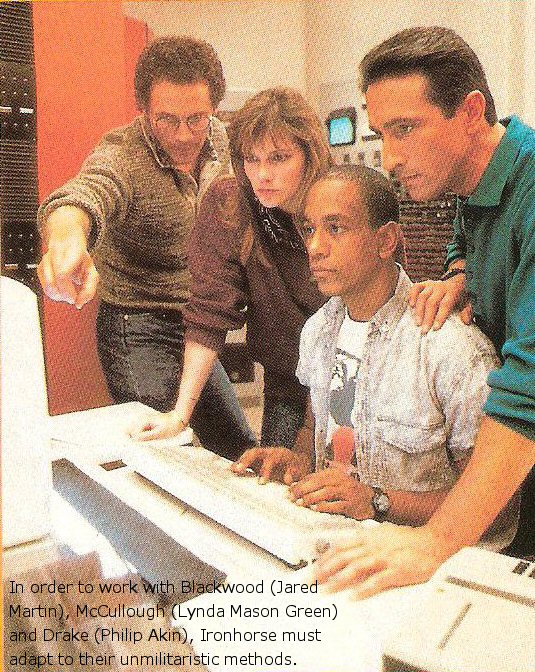
On the War of the Worlds set, Chaves reports, things are only a little different. "We're really into humor," he allows, "but most of what happens is spontaneous, like blooper stuff."
The War of the Worlds set is a huge maze of corridors, laboratories and store rooms, constructed as an underground U.S. Air Force base. Extras costumed in combat fatigues lounge around, waiting for the camera. A Metro Police officer stands nearby, indicating that today, weapons will be fired or pyrotecnics detonated.
Chaves describes the various patches and flashes on his uniform: a Special Forces patch (Ironhorse is a Green Beret, promoted in action in Vietnam); a jumpmaster's (parchute) badge; an 101st Airborne Division (famous for its tenacious stand at Bastogne in WWII) shoulder flash; and a Combat Infantryman's badge.
"It was very tough putting on the uniform again," says the veteran. "Just befroe I left the Army in '73, a bunch of my buddies and I got together for a party. I'll never forget going out into this filed near Big Sur and taking all my green uniforms and putting them into this big pile and having a huge bonfire. I swore I would never wear O.D. green again. Seven years later, of course, I was on stage in Tracers, completely engulfed in O.D. green, but that was because I had a chance to show somebody what it's like to be inside this uniform."
That's a concern Chaves retains in his portrayal of Lt. Col. Ironhorse. "I'm able to give an insight to what this character is like," he maintains. "Even though he has been whitewashed by West Point, and has this facade of strict hardness over him, Ironhorse still has his humanness inside. His more sensitive, vulnerable side is coming out more, I hope, as the series progresses.
"There are positive aspects to military discipline," Chaves elaborates, "which I fell are very important, and that you must have. I don't think anyone would like to have the police in their neighborhood go away. In the same way, I don't think we can be completely negative about the military. They protect us and help us in many ways, such as in natural disasters."
Chaves retired from the Army with a "Specialist 4" classification, or corporal's rank, but he finds no problem with protraying an officer. "It's great," he says. "My father always wanted me to be an officer, and of course as an actor, the responsibility is not nearly as great as in real life. I have the utmost respect for officers. It's a very difficult job. You don't have many friends, and sometimes you have to make life-and-death decisions. People think that officers make these decisions without any heart, but I have seen grown men sit down and cry when they lose a man. They have to live with mistakes like that for the rest of their lives. So, it's an honor, to be perfectly honest, to portray a character like Ironhorse. I hope I get it right."
Military response has so far beeen favorable. "I have fan letter," Chaves reports, "from military people all the time. They give me advice, too. When I was at a SF convention in Washington, D.C. recently, there were a number of military personnel there, some fromt he Pentagon. I had a guy give me some patches to update my uniform. They thought I really had been an officer, but I never was. I had just spent a lot of time around them, because of my dad and because of my own service. There were a couple of girls in the audience who said I looked too young to be a Lt. Colonel. I'm 37, but there are Lt. Colonels in the Army my age."
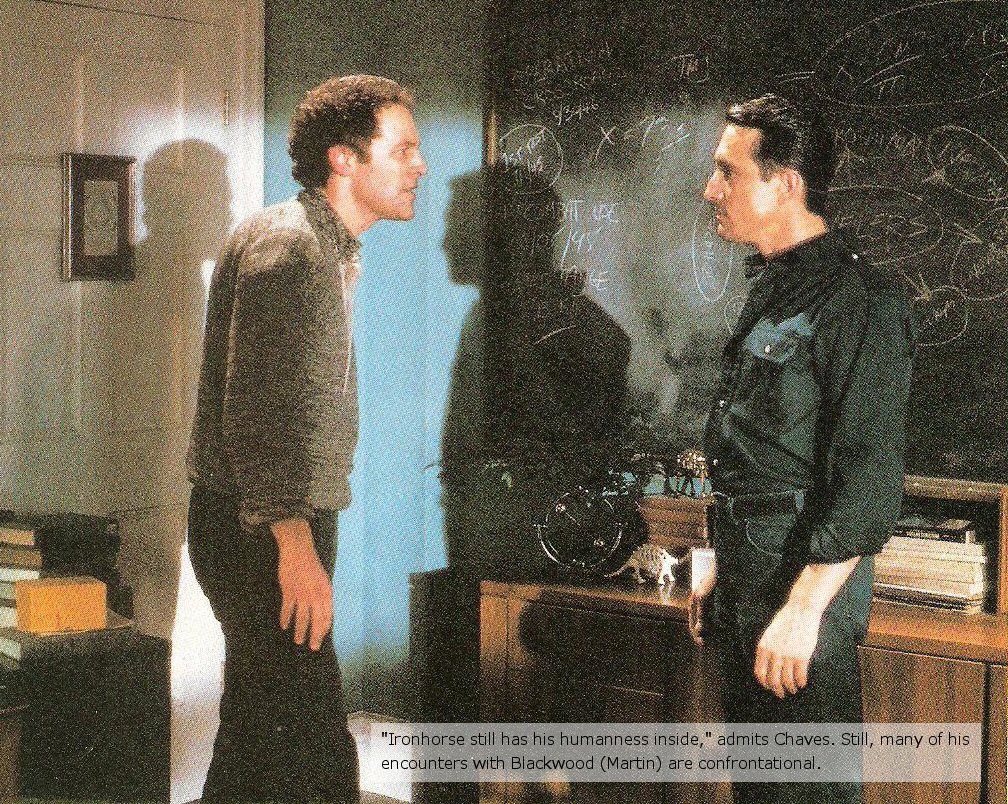
Alien Attacks
Not every aspect of playing the character is positive. Simply wearing Ironhorse's uniform can bring back unwelcome memories. "Sometimes, you remember things you wish you didn't," Chaves reveals, his voice thickening. "You did what you were told. The war would have been done much quicker, but they wouldn't let us do it the right way. We didn't have any say. But there were times we said, 'No.' I said, 'No,' sometimes, for my own personal integrity. There were times when they would ask you to do something stupid that shouldn't be done, taking a risk that didn't have to be taken - like dropping us onto a ridge right on top of the enemy, instead of letting us come up from behind. If the person making the decision, who doesn't have to take the risk, knows that if he puts people in a stuation, they're gone, why do it? Military tactics were often no even taken into consideration in Vietnam."
"There were simple things too, like going into the rear after being out in the bush, and having some spit-shine young West Point lieutenant come up and say, 'How come you haven't turned your weapon into the arms room?' You say, ' Because I don't want to, sir. I like to keep my weapon with me.' Sometimes , you say, 'No.' Sometimes, you get into trouble. You can even go to jail."
Ironhorse, Chaves reveals, also finds his own loyalties slpit. "It happens that there's red tape involved and he can't get anything done. He knows that action must be taken, but he has to get upper echelon approval. So more and more, he's getting frustrated with going through the chain of command. We have a typical example in one show where Ironhorse's authority is usurped by an Air Force colonel! There's no way. So, Ironhorse is having to make decisions on his own. That's taking him away from his military strictness, trying to find other ways to get things done. He's confronted with an enemy not from the East, not from the West, but from 'out there.' That trancends all the military strategy, training and anything else ha has ever had.
"Norton Drake, with his Cray computer, can access information illegally at any time. Ironhorse has had some problems with them accessing Pentagon records, but it has gotten to the point now where he just turns a blind eye and lets them do it.
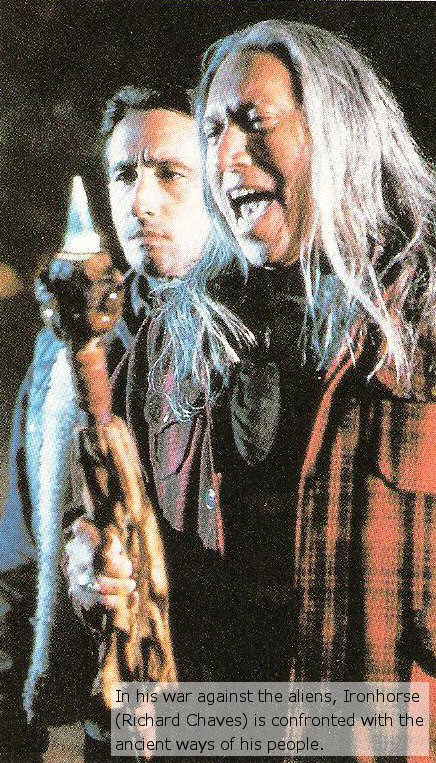
"Besides that, there's me, wanting to make the character more accessible, to take that rod out of his backside, that many military people have there. But there will be inner struggle with Ironhorse," Chaves promises. "We will see more and more real vulnerability and humanness."
There was a woman in Ironhorse's life, jsut briefly, in the episode "Dust to Dust," when half-Cherokee Ironhorse visited an Indian reservation. "I hope there will be another one," Chaves comments. "Hopefully, she'll be of Indian descent, and, if not, hopefully, she will be intelligent - not necessarily a goddess as far as beauty is concerned, but a straightforward, strong woman."
The actor moves to his dressing room where makeup FX artist Bill Sturgeon meets him. Sturgeaon begins fitting a sheet os flesh-colored rubber over Chaves' head, in preparation for a plaster-facial casting.
He is aware of being a sex symbol, but he demurs, "I get a little shy about it, as I guess most guys do. At the last few SF conventions I attended, the girls laid it on hot and heavy. 'You look great in those jeans. How old are you? Are you married? How do you keep your figure?' All the goo-goo, gah-gah stuff. In my fan mail, many of the women allude to my looks and so forth. I look in the mirror every day, and I see all the faults that other people don't see. I see myself as an adventure hero in science fiction, which I'm really getting into. I'm a little embarrassed by it, but I do appreciate it."
With that, looking bald as an egg, in rough jeans and T-shirt, Richard Chaves hurries off to the makeup FX shop to have his face smothered in casting resin. "Look at me!" he calls over his shoulder. "Really glamorous, eh?" ※